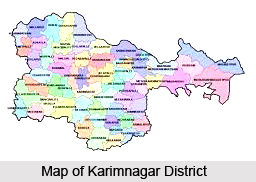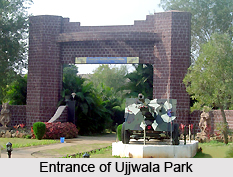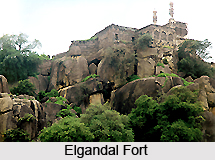 Karimnagar district is located towards the north-western part of Telangana. The district headquarter of Karimnagar is Karimnagar town. Karimnagar forms the part of the Telengana region. The district has derived its name from late Nizam, Syed Karimullah Shah.
Karimnagar district is located towards the north-western part of Telangana. The district headquarter of Karimnagar is Karimnagar town. Karimnagar forms the part of the Telengana region. The district has derived its name from late Nizam, Syed Karimullah Shah.
History of Karimnagar District
The history of Karimnagar district dates back to the Old Stone Age that is to 1, 48,000 BC. Once upon a time, the district of Karimnagar was known as the seat of Vedic learning. The age of Karimnagar can well be understood from the several tools and materials that are found in the region. In addition to the tools even the culture of the district testifies the fact that it is as old as the Old Stone Age. Various archaeological excavations at places like Pedda Bonkur, Dhollikatte and Kotilingalu confirm the fact that Karimnagar was ruled by the Satvahanas, the Mauryas and the Asafzalu kings. A number of constructions which are still present in the district of Karimnagar give strong historical evidences of the district of Karimnagar.
Geography of Karimnagar District
Lying towards the north-western part of Telangana, the district of Karimnagar is bounded within 18 and 19 degrees north latitudes and between 78 and 80 degrees of east longitude. To the north of Karimnagar district is Adilabad, to the west is the district of Medak, Nizamabad lies to the north-west of Karimnagar District, to the south lies Warangal and River Godavari lies to the east of Karimnagar district. The major rivers of the district are Godavari and Maniar. Karimnagar district occupies an area of 11,823 square kilometers. Karimnagar has been divided into 57 mandals.
 Demography of Karimnagar District
Demography of Karimnagar District
According to the census of 2001, Karimnagar district has a population of 3,491,822. 19.44 percent of which belong to the urban group. The density of population in Karimnagar is 294 people per square kilometer. The overall literacy rate in the district is 56 percent. In the district of Karimnagar 67.86 percent of the males are literate and 44.19 females are literate.
Religion in Karimnagar District
Majority of the residents in Karimnagar district practice Hindu religion. But there is also significant Muslim influence in the region because in the ancient times even a few Muslim rulers had ruled the region. In Karimnagar district around 80 percent of the population follows Hinduism, 15 percent follows Islam, 4 percent of the population are followers of Christianity and only 1 percent of the population in Karimnagar district follow Sikhism. Temples, mosques, churches and gurdwaras are integral part of Karimnagar district. It is true that a variety of religions are present in the district yet the people of Karimnagar district co-exist with each other in happiness and peace.
 Education in Karimnagar District
Education in Karimnagar District
Karimnagar district is an important seat of education in the state of Telangana. Several well known intellectuals have been born in the region and consequently adds to the pride of the region. The educational institutes in Karimnagar district provide degree in a variety of traditional and professional courses. Some of the well known educational institutes of the region are Sivani School of Nursing, SRM Institute of Medical Sciences and Technology, Trinity College of Education, Alphores Institite of Mathematical Sciences, University Satavahan PG College, Justice Kumarayya College of Law and a lot more. Thus it can be said that the district of Karimnagar is no way backward in the field of academics.
Economy of Karimnagar District
The main industries in which the people of Karimnagar district are employed are Kesoram Cements at Basantnagar, Ramagundam Fertilizers, Ramagundam Thermal Power Station. Forestry is a major occupation in the district of Karimnagar as it has been promoted by the government of Telangana. Coal being one of the most important mineral resource of the district, many people of Karimnagar is involved in the mining of coal. Apart from these, around 3000 people of the district are involved in some small scale industries like rice mills, saw, oil, dhall and other grain mills, seed and other processing mills. Some of the other industries of the district are manufacturing units of urea liquid, nitrogen, argon gas, liquid argon and liquid oxygen. Handicrafts in Karimnagar district also occupy an important place. The art works which are common in Karimnagar District are Sirsilla cottons, Nakashi Paintings, Ramadugu Stone Craft and Silver filigree. Hence it can be said about the economy of Karimnagar that it is mostly based on the income generated from various large scale and small scale industries and is not based on agriculture.
Tourism in Karimnagar District
Karimnagar district is also well known for its number of popular tourist destinations. Some of the temples in the district of Karimnagar are namely the Kaleshwaram Temple which is a picturesque location. The temple has been dedicated to Mukteshwara swamy. Another uncommon feature of Kaleshwaram is a temple dedicated to Lord Brahma.
The Rajarajeswara Swamy Temple at Vemulawada draws tourist from far and wide and the temple complex also houses temples dedicated to Ganapati, Goddess Lakshmi, Lord Rama and Lord Padmanabha Swamy. The Lord Anjaneya Temple also draws a large number of tourists to the district of Karimnagar throughout the year. Leaving aside the temples there are several forts and constructions in Karimnagar which are of historical importance. The Elgandal Fort is one such example which testifies the royal history of the district. The Ujjwala Park and the Lower Manair Dam are other places of tourist attraction in the district of Karimnagar.
Hence the district of Karimnagar which has a royal heritage stands till this day with its several historical evidences and is an important district in the state of Telangana.






